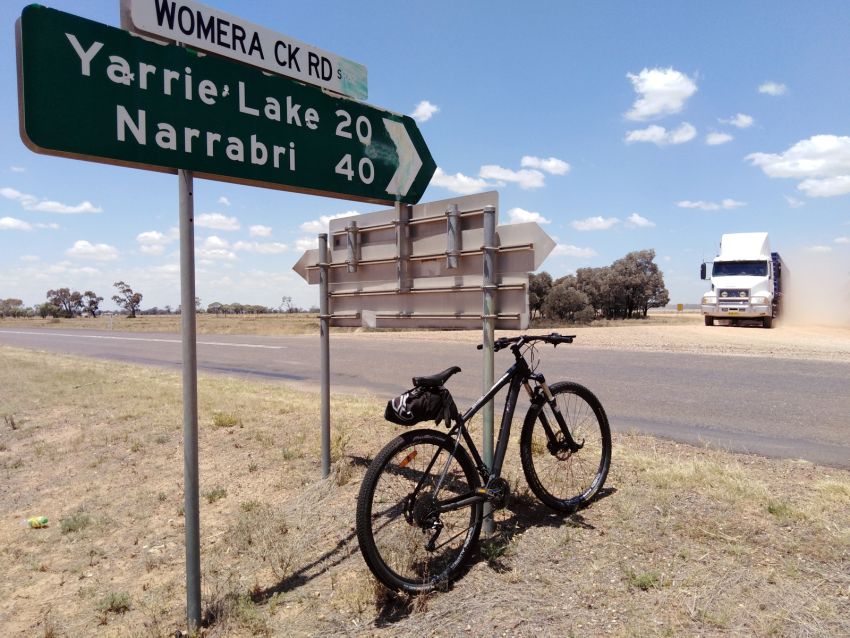
I was as pissed off as most people when Santos' coal seam gas project was approved in Narrabri, despite 98% of people opposing it. So I decided to spend a few days cycling the area in the north-west of New South Wales before it's possibly destroyed forever. Along the way, I met the activists who are fighting back.
Day 4: Narrabri to Pilliga township, via Wee Waa

7.28am There's lots of roadkill on the road from Narrabri to Wee Waa
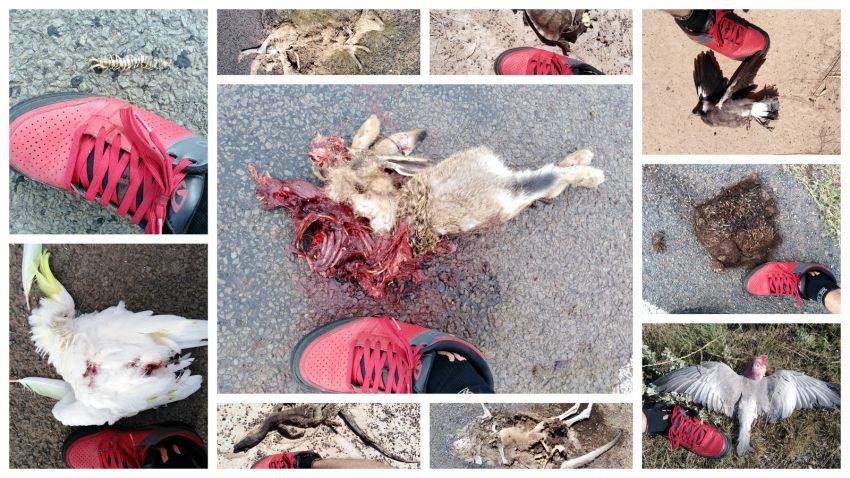
It's harvest time for the countless farms that now cannot get insured due to the threat of Santos poisoning their land and water, so there are more road trains than cars on the road. It's been a bumper harvest and many drop a constant, thin stream of grain onto the bitumen, which explains all the dead birds, but there are also echidnas, lace monitors, kangaroos, rabbits - even centipedes with painful-looking pincers.
8.59am Then there's a reminder that I could become roadkill, too
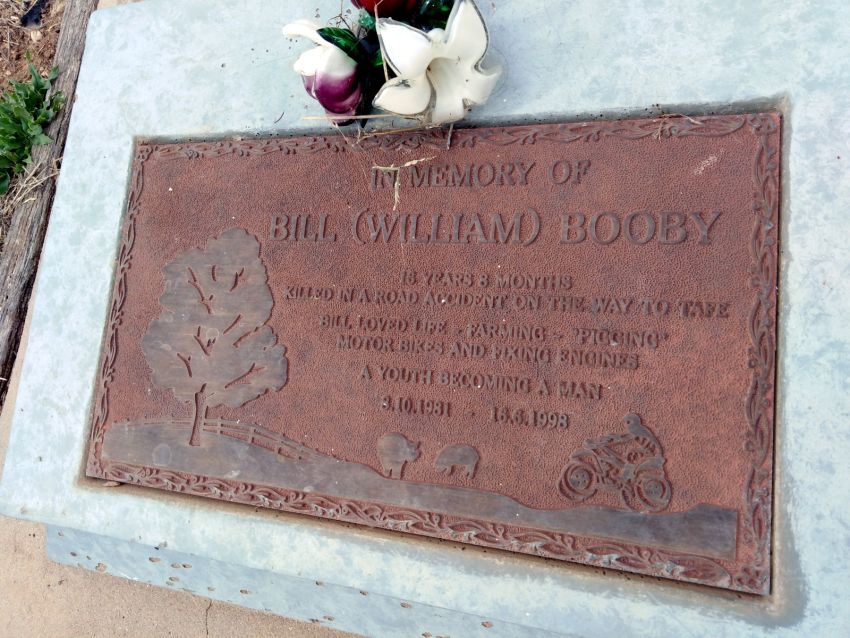
The wall of wind hits you like a ton of freighted bricks each time a road train passes. From watching endless episodes of Outback Truckers, I know that the drivers, who face constant engineering problems, use their brains far more than the average office worker. The last thing they need is another problem in the shape of a dead cyclist. I try to concentrate on that, rather than the few horror stories of cyclists being wiped out. All the road trains give me and my hi-viz vest a wide berth. But then I pass the roadside grave of Bill Booby, a sixteen-year-old motorcyclist who loved "pigging" - the popular local pastime of hunting the wild pigs that destroy farm crops - and the fear returns.
10am Wee Waa has cheap sunglasses, delicious water and a dark history
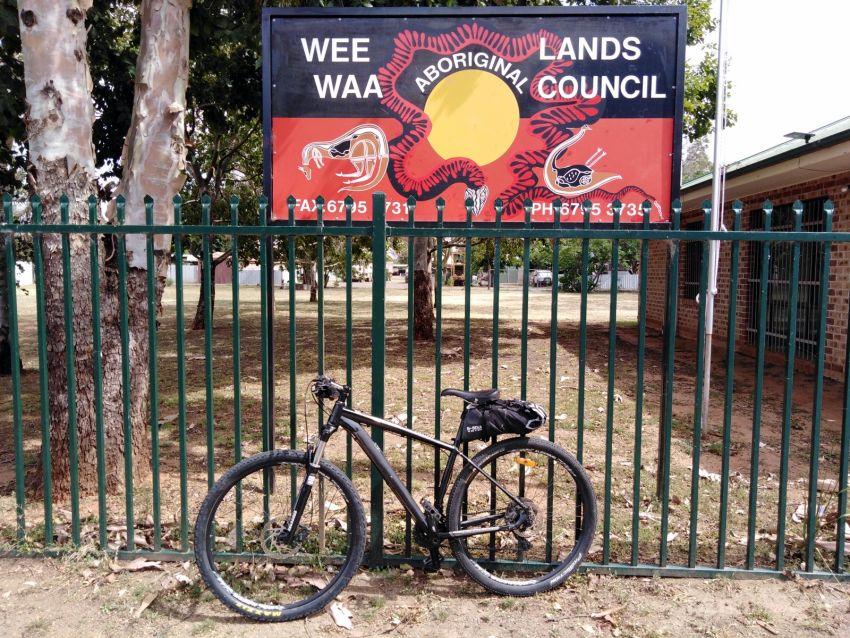
My eyes are bloodshot and stinging from the fan-assisted oven that is the Kamilaroi Highway, so I stop into Wee Waa's IGA supermarket to buy some wraparound shades. The eyewear, combined with the black bandanna I'm wearing to stop me getting skin cancer, make me look like I'm auditioning for an outback version of housing commission sitcom Housos. At the town's public toilets, there's a filtered water bubbler. When you're drinking six litres of liquid a day to stay hydrated, you become a water conoisseur, and the water from the bubbler is the sweetest I'll taste all week. The town's history, however, leaves a sour taste. Eddie Murray, a 21-year-old Aboriginal man, was killed by "persons unknown" while detained in Wee Waa police station in 1981. "This was not a death in custody but a murder in custody," Aboriginal activist and poet Ken Canning said. "The Royal Commission [into Aboriginal Deaths In Custody] found that Eddie Murray died at the hand or hands of persons unknown. But he was in a police station! Who else had access to him? Were the Wee Waa police in the habit of giving out their keys to the Ku Klux Klan?"
11.48pm It's a competition for wackiest mailbox out here
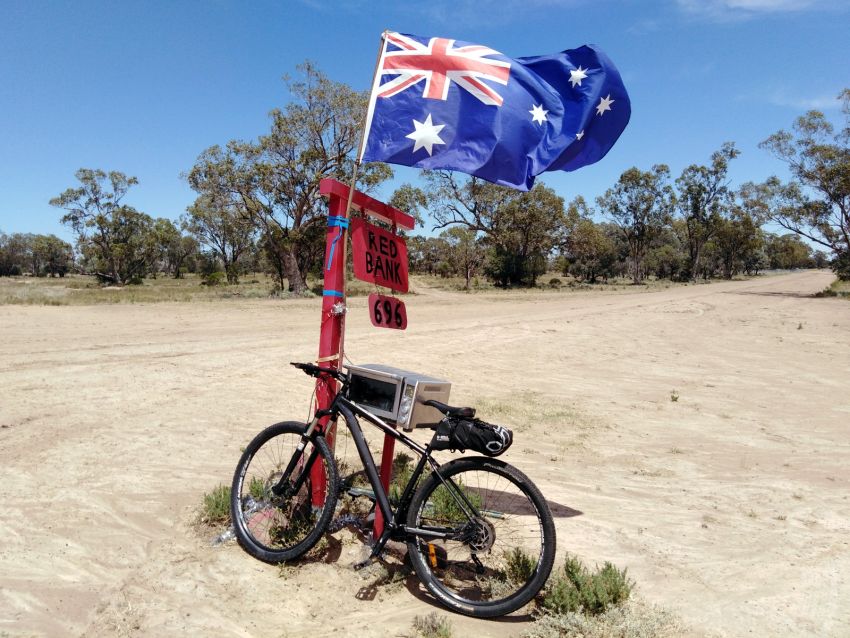
This microwave oven takes the cake on this stretch.
12pm You have to stuff yourself with calories in the shade
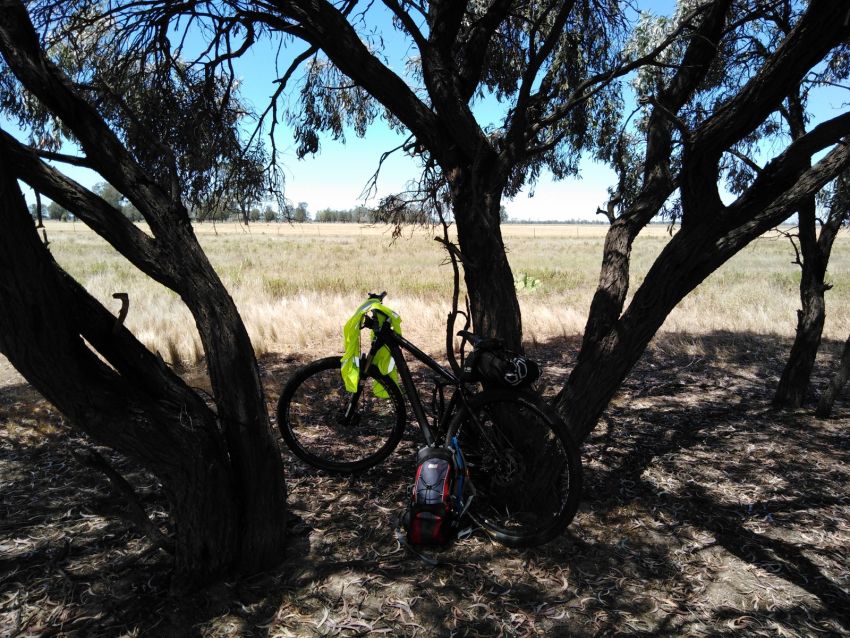
At lunchtime, I duck into the bushes and cram as many sandwiches - the lightest, most nutritious food I could pack - into my stomach as I can without getting cramp.
12.30pm The farms out here are fragile
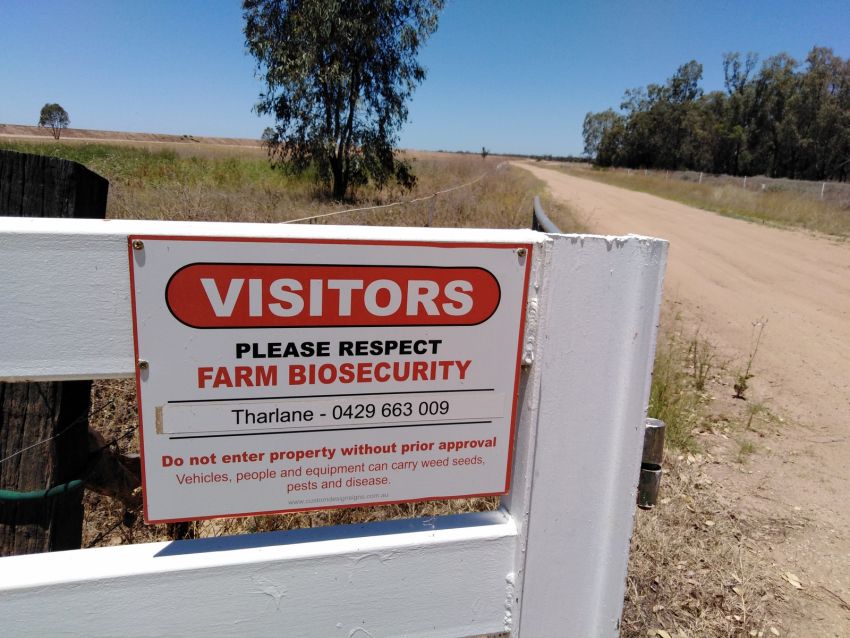
The salt content of the land, which could be made far worse by the waste water from the Santos project, is just one of the challenges faced by farms, which often sport warning signs like this on their entrances.
2pm The road from Wee Waa to Pilliga is long, hot and... well, melted
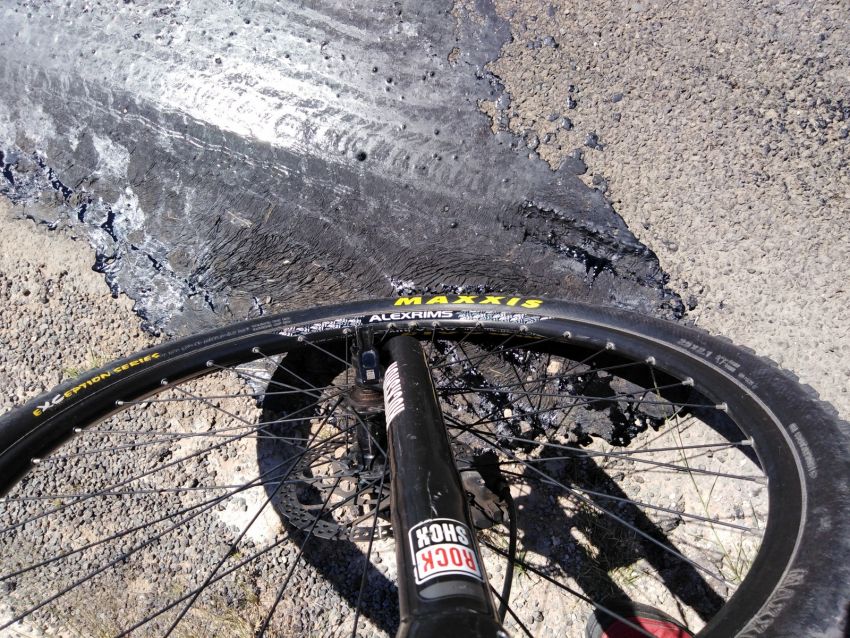
On the other side of Wee Waa, the farmland turns to scorched scrub, burnt-orange dirt and bleached, spiked grasses. The roadkill vanishes. Half the bitumen liquefies into reflective, silver-black pools. The road trains dip their tyres into them like brushes into a palette, then paint big, wet, licorice stripes that stretch, shining, into the horizon. In some places, the road is so cooked that the trucks carve up the tarmac like chocolate cake, leaving it heaped in splurging, stacked mounds. This is what you have to navigate as a naive cyclist, trying to cycle the sweltering 100km from Narrabri to Pilliga township. The scenery is mesmerising, but if you look at it too long, you'll cycle straight into hot tar, as I did. It then gets all over your bike, all over your clothes, all over your fingers. Don't even think about masturbating.
4pm I limp into Pilliga township
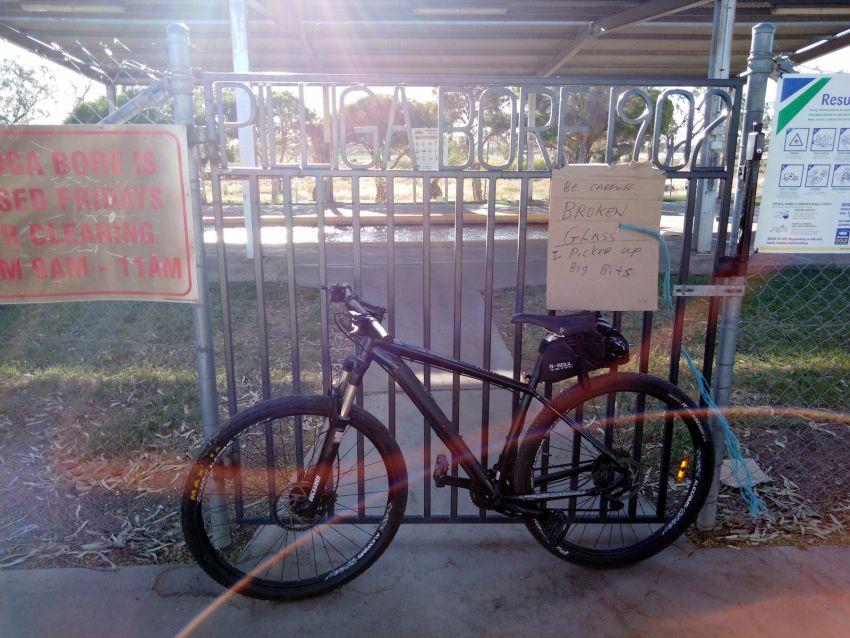
I literally limp into the outskirts of Pilliga, as the melted tar on my front tyre has picked up a huge mound of stones, which has made my front wheel bump up and down for the past 20km. I roll, wonkily, down past the dried, flattened carcass of a squashed cat in the car park to the township's famed hot bore baths. I lean my bike next to a cardboard sign someone has hung on the fence. "Be careful," it says. "Broken glass. I picked up big bits." Santos' Narrabri gas project threatens to contaminate the whole of the Great Artesian Basin water table that feeds these hot baths. As I contemplate the small irony of the baths being contaminated by broken glass, a gruff voice behind me says: "Jump in and I'll take yer picture!" I turn around to face a bearded forty-something with just a few, wonky teeth. "Ah," I say. "I've just cycled 100km, including through melted tar..." "You stupid baaaastard!" he cackles. "I've just driven up from Dubbo, in two and a half hours." "Er," I say, "so I've just done that long ride, so I'm gonna go check in to my hotel first... Are you going in? Maybe just put some plastic bags over that," I say, pointing at the brace he is wearing for a broken leg. "That's not a problem," he says. "I can just take that off! My colostomy bag's the problem. I can't be a poofter, right, cos I've had the arsehole cut out of me, so now I've got a colostomy bag. Well, I call it a colostomy bitch, cos my wife was a bag. I call it a colostomy bitch because I don't pay attention to her she shits all over me!" He cracks up laughing again, then he looks contemplatively at the baths. "Mind you," he says. "I've got 15 minutes." "OK," I say. "I'll go check in."
4.30pm Pilliga township looks to be doing it tough
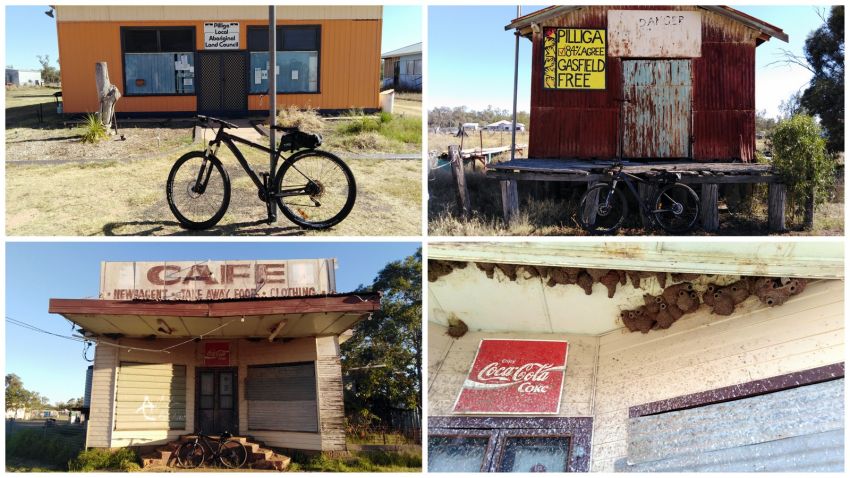
Many of the wooden homes look to be in need of repair. A few sport anti-coal seam gas slogans. A colony of starlings has taken over a shuttered cafe. One of their young lies dead and dessicating on the baking flag stones of the cafe's forecourt.
5pm My hotel room looks like two prison cells joined together
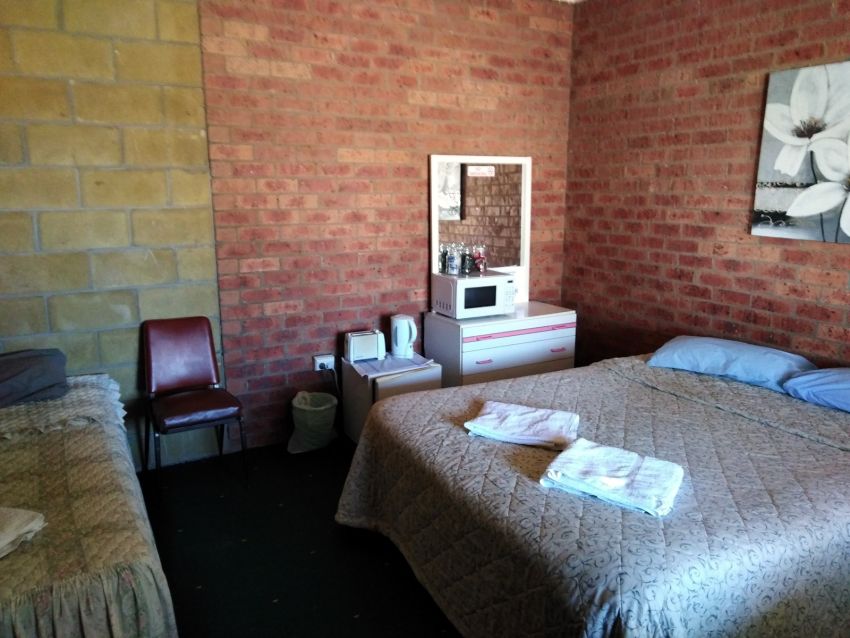
The walls are mismatched and there are insects crawling across the carpet.
5.05pm Breakfast is served five minutes after you check in
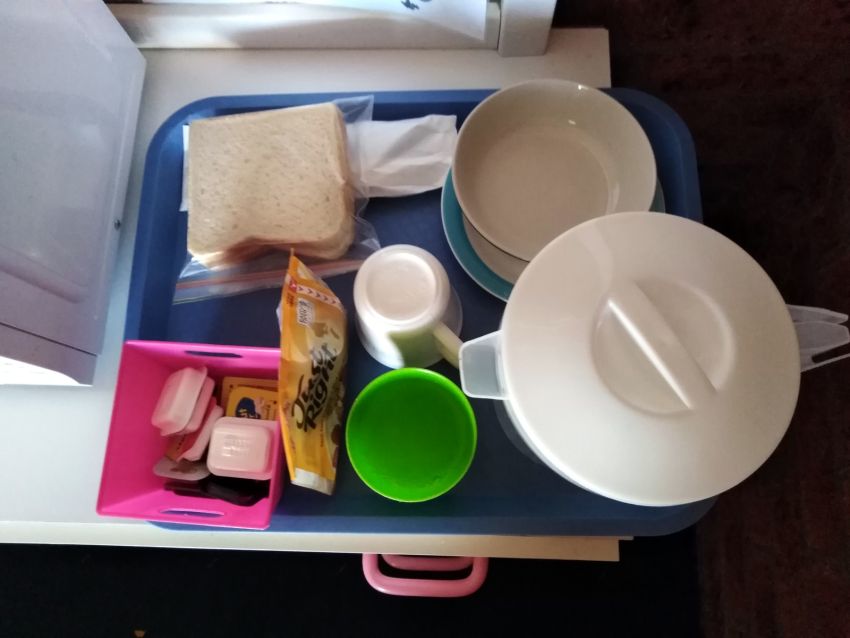
There's a knock at my door. It's Adam, the well-built guy who checked me in, proffering a tray stacked with two slices of white bread in a ziplock bag, a single-serve sachet of muesli, several catering serves of jam and two small cartons of long-life milk. "Oh, THAT'S GREAT," I say, genuinely delighted at the prospect of not having to hunt out extra calories in the morning. "I didn't realise breakfast was included!" Adam looks at me as if I may be mentally ill. "Righto," he says.
5.30pm The hot bore baths are sulphuric and soothing
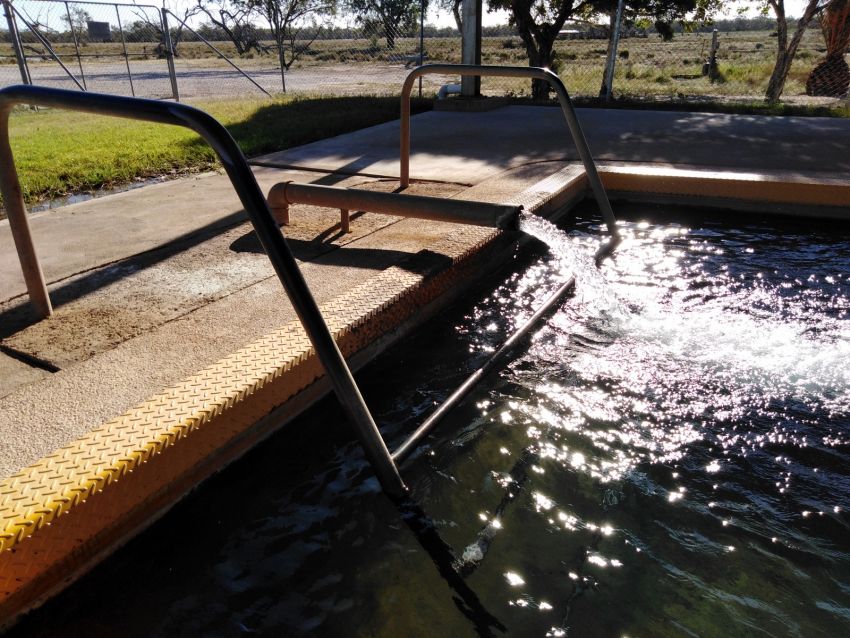
At the hot bore baths, there are anti-coal seam gas stickers everywhere. Many activists have obviously made the same connection that I did. I ease myself into the water and the warmth permeates my bones and calms the raging, red clusters of mosquito bites around my ankles. I put on my goggles and dip my head under the surface. There's no broken glass, just gum leaves, sand and concrete pebble-dashed with red rocks. I put my head and shoulders beneath the gushing pipe and let its fierce current pummel me. It takes me 10 attempts to get out, such is the alluring pull of the healing waters. The only disconcerting thing is the smell of rotten eggs, which I would have normally instantly dismissed as the result of the water picking up sulphur on its way to the surface. I look over at the sign displaying the rules for bathing. It seems almost everything is banned, including nudity, but it says nothing about colostomy bags.
6pm Beware of snake bites
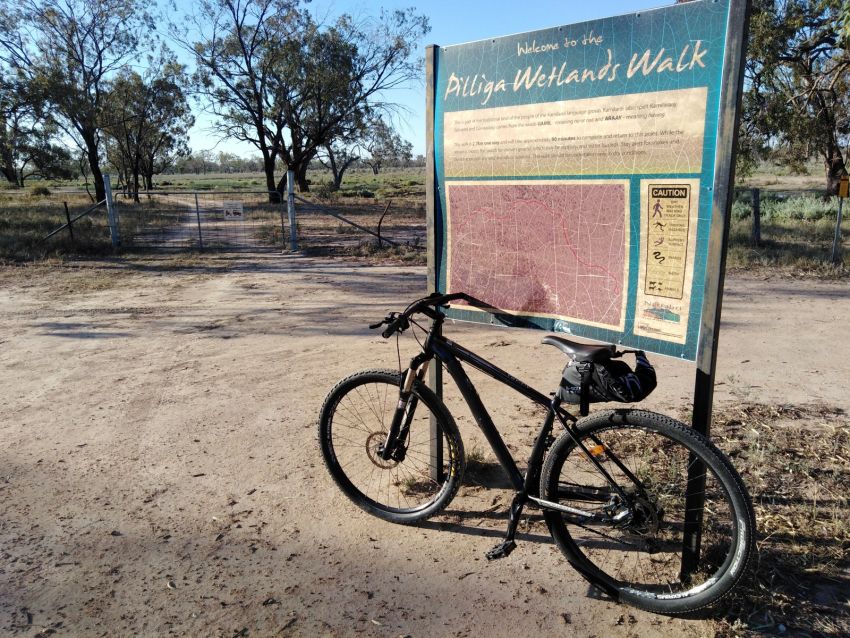
I make my way over to the wetland walk opposite the bore baths. A sign warns of snakes. I cycle the path, past respectful, graffiti-free signs explaining the ways of the Gomeroi people. After I pass several scar trees, where the Gomeroi removed the bark to make coolamon and canoes, several bulls block the path. Every time I edge forward towards them, they edge forward towards me, undaunted. They have no horns, but I'm not risking it. I lower my bike over a fence and follow, then jump into the saddle. The bike crunches to the ground. Both tyres are flat, riddled with tribulus terrestris, or "puncture vine". The hard, spiked seeds have sliced straight through the hard rubber. The front inner tube is like a sieve. The back inner tube has three punctures, including two close together, as if pierced by the fangs of a snake. Cursing, I carry my bike 2km back to the hotel.
7pm No one in the pub wants to talk about coal seam gas
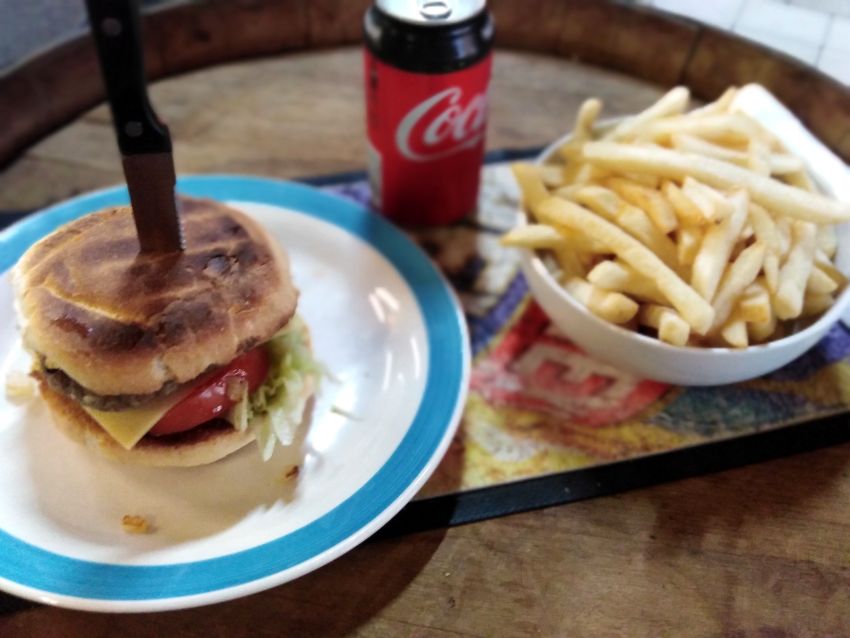
After perusing the chalkboard at the hotel bar, I order the most enticing item, a Pilliga Burger. "The Pilliga Burger's just a plain burger," says Adam, seemingly keen to snuff out any hopes I may have. "That's good," I say doubtfully, then as I swipe my card to pay, I add, as casually as possible: "I've, ah, seen a lot of anti-coal seam gas signs around town. What do you reckon to all that?" Adam looks at me. "Ah, I haven't really looked into it," he says, then adds, more forcefully: "I don't really know because I haven't looked into it." I look back at him. "OK," I say, then I look hopefully at the only other people in the pub, two middle-aged guys with the crimson blush of long-time drinkers, who have been watching me. They both instantly look the other way and my mouth hangs, empty of words. I sit down. The TV blasts out the ABC's 7.30 Report, which is featuring former Prime Minister Kevin Rudd's push for a commission into the Murdoch media. No one comments on its content. This ain't Politics In The Pub. Adam brings over my burger with a knife impaled straight through it, like that's what he might like to do to my head. It might be my hunger talking, but the burger tastes amazing.
8pm This is how I spend the next three hours
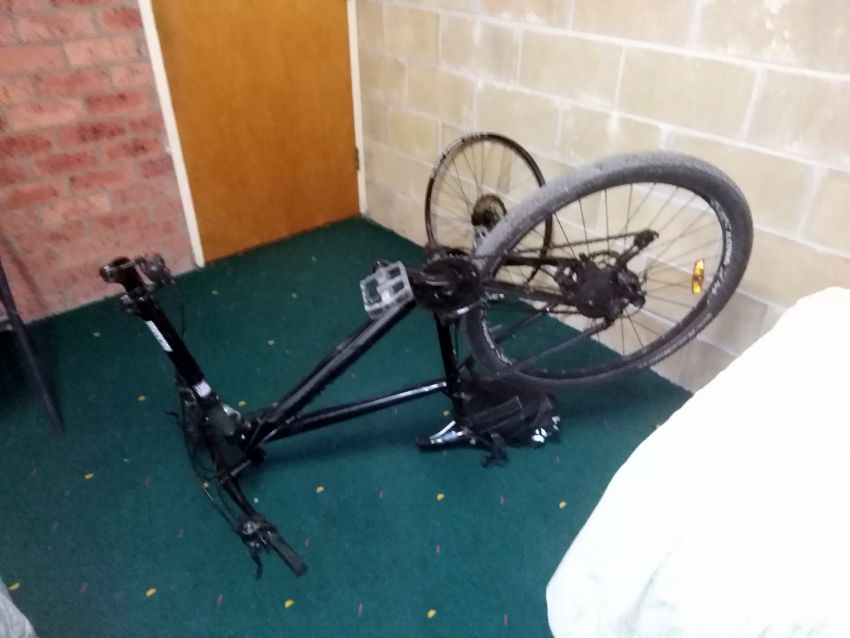
There are no bike shops in town, seemingly no taxi depot, I'm 100km of scorching desert scrub from my Airbnb, my bike is my only transport out of here and I have two flat tyres. I have one spare inner tube and six puncture repair patches with me. I spend the next 180 minutes turning my tyres inside out and picking out the burs with my teeth until the rubber is completely smooth, then patching one inner tube and replacing the other.
11pm There's a cockroach trap hidden behind the armchair
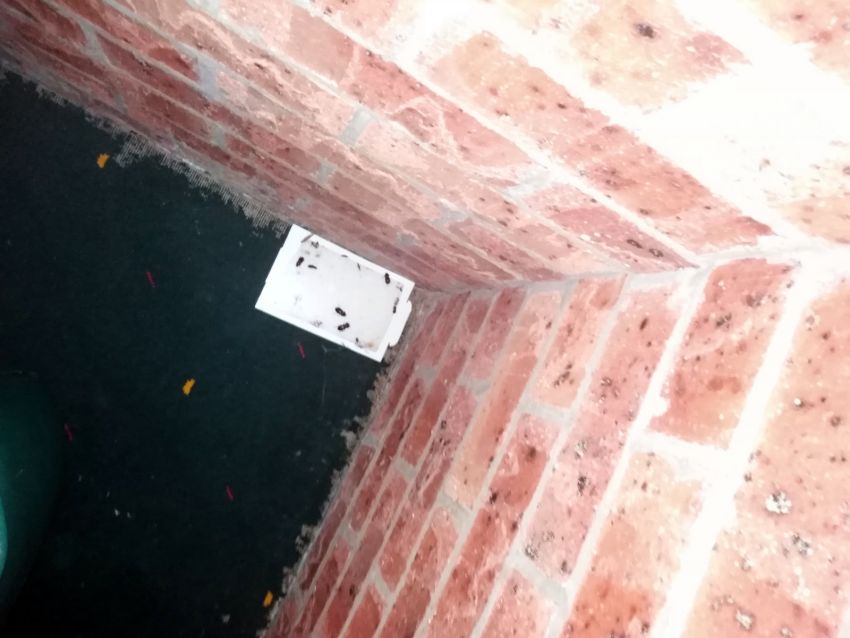
When I booked the hotel, they had advised me I could sleep in a swag for free at the campsite next to the hot bore baths instead. That struck me as bizarre marketing at first, but now it makes sense. Customers can hardly complain when they've been given a free alternative. As it happens, a lightweight tent and sleeping bag would have cost me $400 and I would have had to lug them 100km across the sun-bleached scrub. There would have probably been a procession of marching insects at the campsite, too, and the $89 hotel room even has a fridge to freeze my water supplies solid. On balance, I'm happy, though I'm paranoid about bedbugs, so I go to bed on top of the sheets with the light on. Then I wake in fright every time the air conditioning unit kicks in with a clang.
Day 5: Pilliga township to Narrabri via Yarrie Lake

1pm I take the alternative, dirt road, route back home
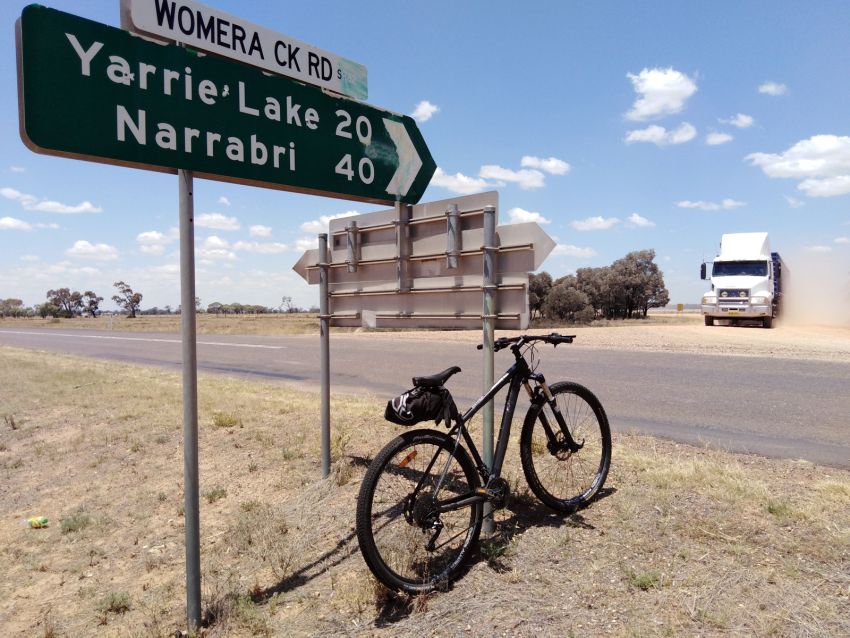
After five hours of cycling through the scrub, I spot the turn-off. This could be a challenge.
1.46pm The dirt road is long and hot, but at least it won't melt
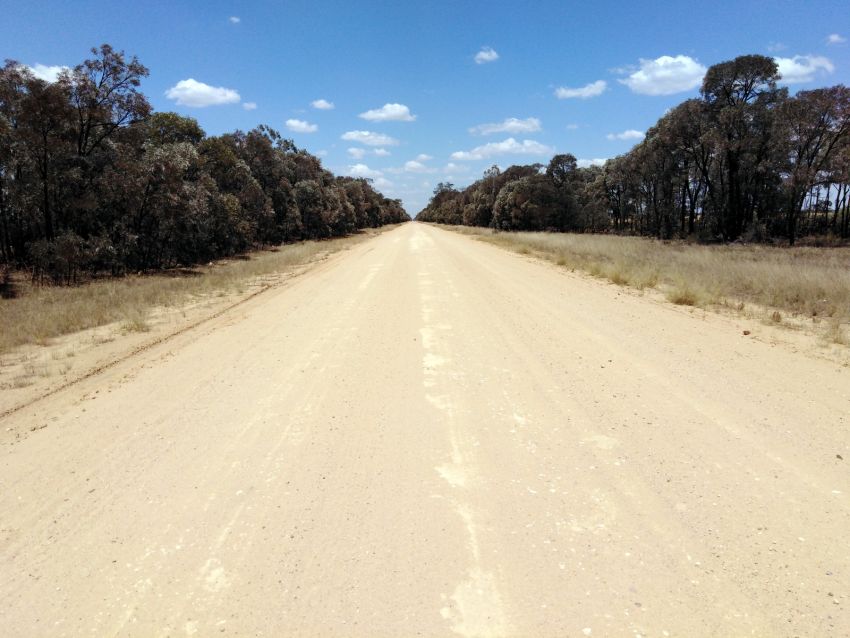
You've got to look on the bright side of a horizon like this.
2.43pm I'm about to run out of water, time, and luck
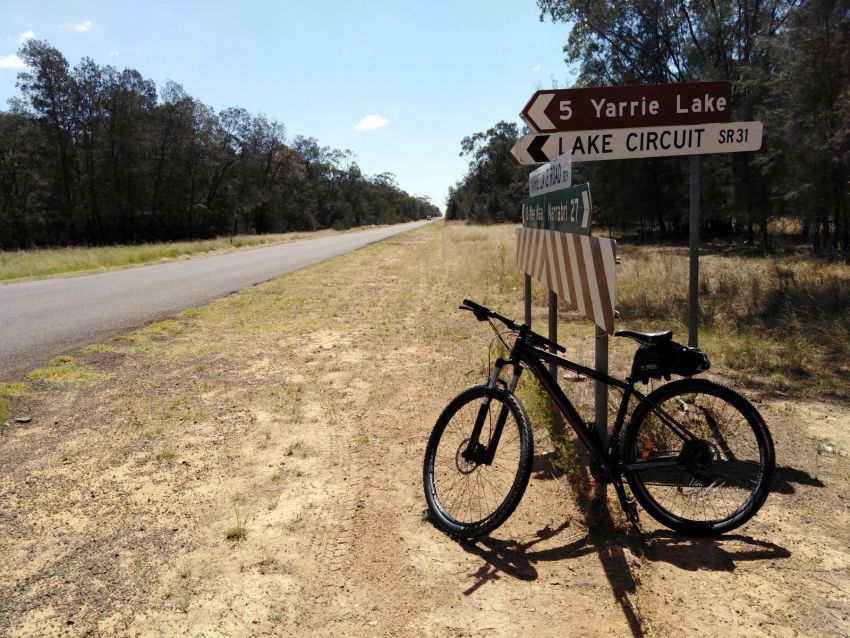
There's a turn off for Yarrie Lake, a huge body of water that fills a depression thought to have been formed by a meteor, but it would add at least an hour to my journey, possibly another puncture, and an unquenchable thirst. I decide to press on.
4.13pm I pass Santos' HQ
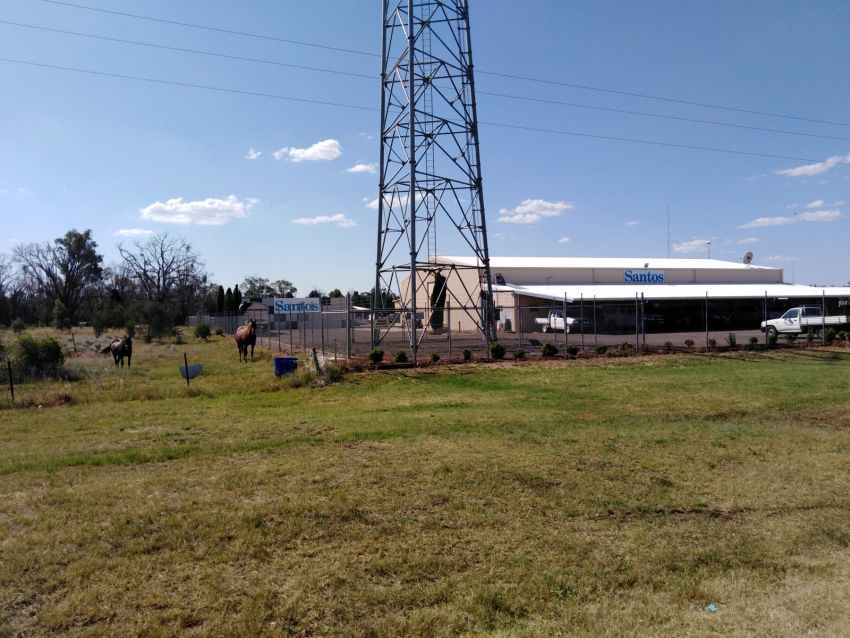
On the outskirts of Narrabri, I run out of water as I pass Santos' 300 Yarrie Lake Road operations centre. In Woolworths' car park, 2km from my Airbnb, I get a puncture as another bur lodges itself into my front tyre. That night I speak to activist Dan Lanzini, who gives me the directions to see Santos' test wells in the Pilliga Forest the next day.
Read Part 4 here.
Comments? Criticisms? Corrections? Email [email protected]
ABOUT THE AUTHOR: Mat Ward has been writing for Green Left since 2009. He also wrote the book Real Talk: Aboriginal Rappers Talk About Their Music And Country and makes political music.